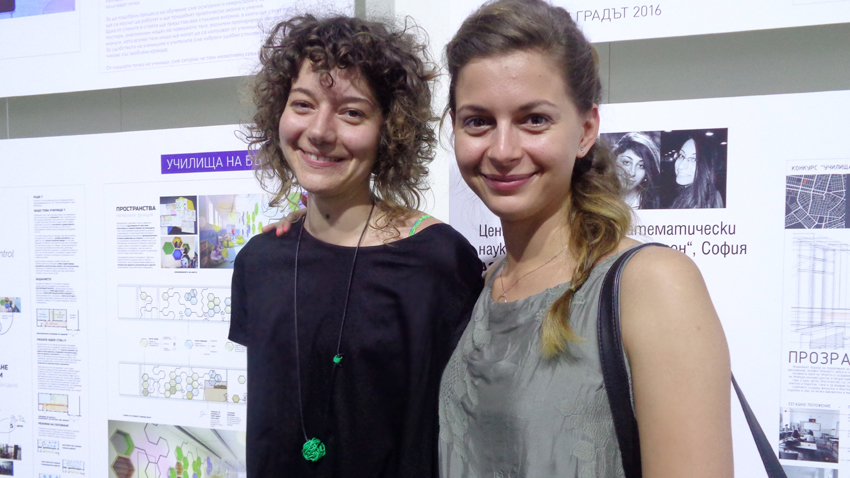Students and graduates of five universities in Bulgaria and twelve abroad, young professionals and even school-goers took part in this year’s third edition of the CITY Academy initiative. The event throws a bridge across borders to talented Bulgarians studying or working in other countries. The competition is mostly about architecture and engineering. The participants worked in three spheres: “Schools of the future”, “Facades, colours, harmony” and “Cities – cities and infrastructure, buildings and interior space”. More than 125 projects from Bulgaria and abroad were shown at the Sofia Event Centre.
Here is how Lilyana Pavlova, Minister of Regional Development and Public Work, addressed the participants:
“The CITY Academy has evolved from a national competition into a cause. It has now acquired national significance and I believe this will lend meaning to the lives of these young people who are studying abroad but hold Bulgaria dear to their hearts. These are important initiatives, projects that can be financed under EU funds. It is important to invest this money wisely, so as to help change our cities and give young people the motivation, with their bold ideas and zeal, to put forward projects of their own. To entice them back to the country and to do something good for the development of our cities, of the urban landscape and infrastructure. I would suggest that they sit in on our councils where we endorse investment plans and projects.”
 In the “Schools of the future” section first prize went to architects Violetka Slavova, a graduate of the Polytechnic University of Milan and Maria Staynova – of the University of Architecture, Civil Engineering and Geodesy in Sofia. Their talented tandem submitted a project “Natural sciences and entrepreneurship centre” at the Nikola Vaptsarov school in Berkovitsa. The two young ladies chose this school especially, as they knew its staff was open to children’s ideas. They were also impressed by the way they had drafted the project they submitted to the America for Bulgaria foundation; they also saw it had been a long time since an architect had worked at the school. So, they thought they could all pool their efforts and do something for the school. But before that they decided to ask the children what they wanted for this space, what their preferences are, what their hobbies and their expectations are. These ideas were welcomed by both staff and children and gave Violetka and Maria with fresh ideas.
In the “Schools of the future” section first prize went to architects Violetka Slavova, a graduate of the Polytechnic University of Milan and Maria Staynova – of the University of Architecture, Civil Engineering and Geodesy in Sofia. Their talented tandem submitted a project “Natural sciences and entrepreneurship centre” at the Nikola Vaptsarov school in Berkovitsa. The two young ladies chose this school especially, as they knew its staff was open to children’s ideas. They were also impressed by the way they had drafted the project they submitted to the America for Bulgaria foundation; they also saw it had been a long time since an architect had worked at the school. So, they thought they could all pool their efforts and do something for the school. But before that they decided to ask the children what they wanted for this space, what their preferences are, what their hobbies and their expectations are. These ideas were welcomed by both staff and children and gave Violetka and Maria with fresh ideas.
“We wanted to talk to the children, it was important to us though few people bother to do so, they would have just talked to the teaching staff. We covered almost the entire process of design thinking and we believe that this makes the results better because it is this thinking that shapes the final product.”
“We were shown drawings of the way the children imagine the centre to be,” the girls say. “They want there to be fish and a terrarium, plants. One kid even wanted a bunker. In fact the children stepped into the shoes of entrepreneurs. They had some experience themselves – they had been making all kinds of pottery and rugs. And their ideas were a real eye-opener. From then on our job was simple, it was no effort at all.”
In the “Facades, colours, harmony” category, the award went to Evgenya Evtimova from the University of Forestry in Sofia for her project “Origami colour scheme”. The third contest – “The City” was in two categories. The award-winning projects were by Dimitar Stoynev from the Manchester School of Architecture, Tsvety Stoycheva from New Bulgarian University for “National Art Academy training centre” and Elena Pavlova from the University of Architecture, Civil Engineering and Geodesy in Sofia for “Remodeling a railway factory into a museum of modern art.” Other prizes were also awarded in each of the categories.
English version: Milena Daynova
The usurpation of cultural heritage is one of the many inevitable consequences of any military conflict, both historically and today. Until the end of the war in Ukraine, it is impossible to adequately analyse the extent of the damage caused to the..
Athens plans to modernise the Greek army by 2030 Greece's Defence Minister Nikos Dendias presented the plan for changes in the army to the parties in parliament. The reforms will cover all three branches of the military. By 2030, 33 units..
A short video kaleidoscope of the "untold stories" of worthy Bulgarians - scientists, entrepreneurs, engineers, artists - who have contributed to our country's good image in the eyes of the world opened an unconventional public forum that showcased the..
Over 3.5 million Ukrainians have arrived in or passed through Bulgaria since the beginning of the war. Nearly 200,000 people have found temporary..
At the Bulgarian Embassy in London, Prof. Bettany Hughes presented excerpts from the new BBC series - Wonders of Bulgaria. Prof. Bettany..
An innovation for the treatment of diabetic foot ulcer using the patient's own tissue and artificial intelligence has been implemented at the University..

+359 2 9336 661
